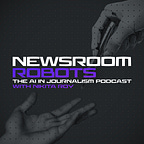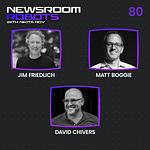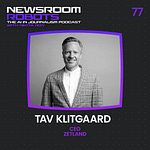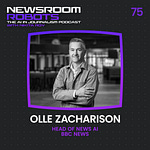This week's headline news - The New York Times' lawsuit against OpenAI and Microsoft over copyright infringement - has brought the complex issues of copyright law and generative AI technology back into the spotlight.
The New York Times claims that OpenAI and Microsoft used millions of their articles without permission to train AI chatbots like ChatGPT, a practice they allege infringe on copyright laws.
I shared my initial thoughts on Yahoo Finance Live a few hours after the news broke on Wednesday. You can watch that interview here and read about it in this article. I'll discuss the case further tomorrow on CBC News Network in Canada at 12:15 pm ET.
In my opinion, this is likely to be a landmark legal case that could finally provide some answers on whether the way large language models are trained infringes on publishers' copyrights.
I recorded this week's podcast episode before this news broke. Still, the discussion with my legal expert guests, Nina Brown and Jared Schroeder, seems more relevant than ever in light of the Times' move to take on tech giants OpenAI and Microsoft in court.
Nina is an award-winning associate professor at the Newhouse School of Public Communications at Syracuse University. After graduating from Cornell Law School, she practiced law for several years before joining the Newhouse faculty. Her research now focuses on the legal issues with deepfakes, and emerging issues related to works created by artificial intelligence.
Jared is an Associate Professor of Media Law at the University of Missouri School of Journalism. He is the author of three books, including his upcoming book, The Structure of Ideas: Mapping a New Theory of Free Expression in the AI Era, published by Stanford University Press.
We structured our wide-ranging discussion around three central themes:
1️⃣ Copyright Questions Around Data Used to Train AI and Outputs: There's still lots of uncertainty, but arguments can be made that the models' learning constitutes "fair use." Newsrooms determining copyright ownership for AI-generated articles, images, and other content will be a complex analysis —the more human creative input, the stronger the case.
2️⃣ Defining and Regulating Generative AI Models: According to their legal opinion, generative AI models like GPT are best classified as tools. The users of tools like ChatGPT, not the tools themselves, would likely bear responsibility for problematic outputs like false information, copyright infringement, or defamatory content.
3️⃣ Mitigating risks when incorporating AI into newsroom workflows: Limit use cases where generative AI interfaces directly with the audience, as there is a higher liability for harmful, inaccurate, or illegal content without human oversight.
This is one set of legal opinions, and I will further explore different sides to these legal issues in the upcoming episodes of Newsroom Robots.
🎧 Listen to the full conversation available now on Apple, Spotify, Google, and other major podcast platforms.









